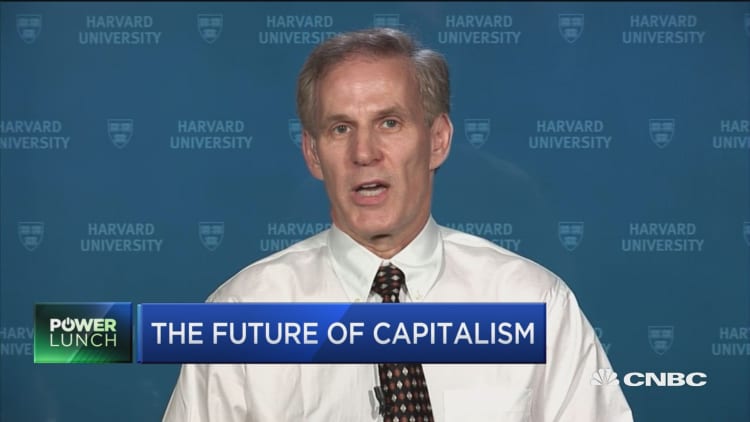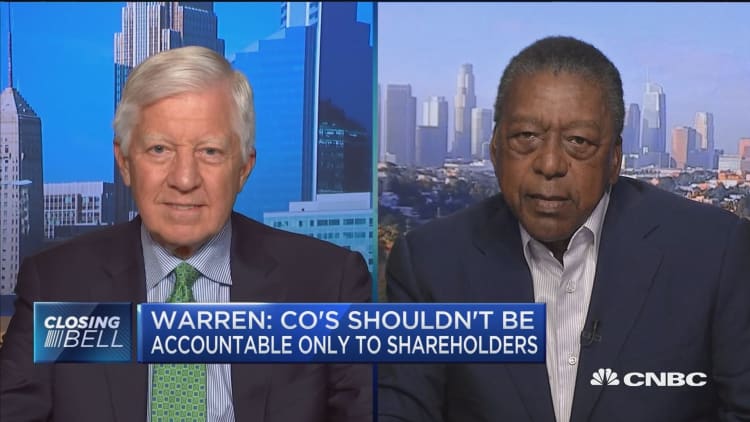
Sen. Elizabeth Warren's corporate responsibility bill could help destroy capitalism, Harvard University economics professor Jeffrey Miron told CNBC on Wednesday.
Warren's proposal "will create a whole set of new rules that the federal government will enforce. Those rules will not be clean, explicit or simple. They'll be messy, they'll be complicated. [It will create a] huge ability for companies to evade and avoid," Miron said on CNBC's "Power Lunch."
"It's just a recipe for more crony capitalism, not for more productive capitalism," he added.
Warren, a Democrat from Massachusetts, unveiled plans for her new legislation, the Accountable Capitalism Act, in an op-ed in The Wall Street Journal on Tuesday. The proposed bill would require corporations with more than $1 billion in annual revenue to obtain a federal charter. The charter aims to mitigate income inequality by obligating company directors to consider the interests of all stakeholders, including employees and those in the community where the company is based, not just those who own the stock.
Black Entertainment Television co-founder Robert Johnson said companies that are run well are already taking into account all stakeholders, including employees.
"Most companies and most boards look at all of their stakeholders, not only their shareholders. They look at their employees, they look at the community where they reside and do business, they look at even the vendors that they do business with. So I think it's a solution in search of a problem that's absolutely not necessary," Johnson said on CNBC's "Closing Bell."
Johnson said despite Warren's best intentions of "channel[ing] Robin Hood," the type of government intrusion in industry she is proposing has "the dangerous potential of channeling Karl Marx."
"Her intentions may be great, but putting the government in the middle of how corporations in this country are run is a slippery slope toward a socialist economy that does not, in my opinion, work in the American system," Johnson said.
Miron, who is also director of economic studies at the Cato Institute, argued the new charter will discourage companies from honoring the rule of law. Only "honest" and "law-abiding" companies will comply, meaning it is those companies that also will bear the brunt of the regulatory burden, and, ultimately, those companies that will leave the U.S. for countries with friendlier regulations.
"If we make it more onerous for companies to locate in the U.S., they're going to locate somewhere else. And that hurts precisely the group Senator Warren is trying to help — that is, the employees of these corporations," Miron said. "They will have no jobs instead of jobs with wages she thinks are too low."
As for income inequality, Miron said it is still an "open question" as to whether policies should try to reduce income inequality created by a free market.
"The right way to help people who are very poor is through a social safety net of the kind that we already have ... not to interfere with capitalism, which is going to make a lot more people have low income and be poor, in particular by driving corporations out of this country," Miron said.
If consumers really don't like a company's lack of transparency or business practices, Miron said, it's up to them to make it known.
"They can organize boycotts. They don't buy the product; they don't buy the stocks. That drives down the value of the company, and then the management and remaining shareholders will respond," Miron said.
"The market is a much better way of encouraging companies to respond to consumer wants and needs than this top-down rule that will end up just generating more insiders and less accountability," he added.
Warren's office did not immediately respond to CNBC's request for comment.
— Tune in to "Mad Money" on Wednesday at 6 p.m. ET to watch Jim Cramer's full interview with Sen. Elizabeth Warren.



